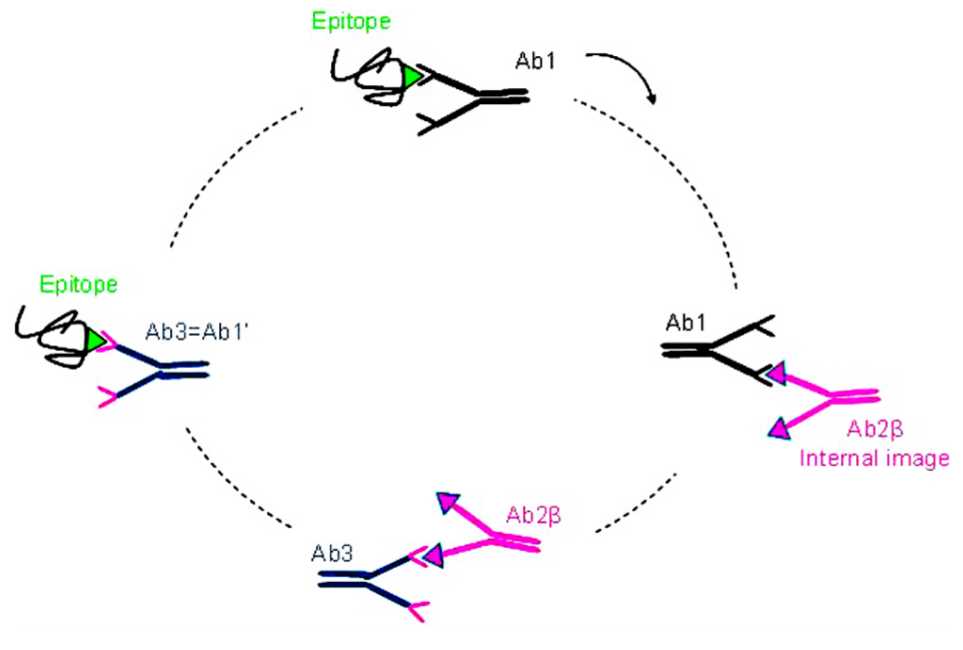Anti-Idiotype Vaccine Development Service
The use of anti-idiotype (Id) antibodies as vaccines to stimulate antitumor immunity is one of several promising immunologic approaches to the therapy of cancer. Extensive studies in animal tumor models have demonstrated the efficacy of anti-Id vaccines in preventing tumor growth and curing mice with established tumors. A number of monoclonal anti-Id antibodies that mimic distinct human tumor-associated antigens (TAAs) have been developed and tested in the clinic and demonstrate encouraging results. Creative Biolabs is a world leader in the field of cancer vaccine development. With our extensive experience and advanced platform, we are therefore confident in offering the best development services for anti-idiotype vaccines. We guarantee the finest results for our customers all over the world.
Anti-idiotypic vaccines comprise antibodies that have three-dimensional immunogenic regions, designated idiotopes, that consist of protein sequences that bind to cell receptors. Idiotopes are aggregated into idiotypes specific of their target antigen. In general, the antigen mimicry by anti-Id antibodies has reflected structural homology in the majority of the cases, and amino acid sequence homology in a few of them. The greatest challenge of immunotherapy by means of anti-Id vaccines is to identify the optimal anti-Id antibody that will function as a true surrogate antigen for a TAA system, and ideally will generate both humoral and cellular immune responses.
Idiotypic Network
Lindenmann (1973) and Jerne (1974) proposed theories describing the immune system as a network of interaction of Abs and lymphocytes. According to this hypothesis, Id and anti-Id network interactions would regulate the immune response of the host against a given Ag. The network theory is based on the fact that in the immune system the Ags are mimicked by idiotopes expressed by Abs and TCR (T cell receptors). According to this network concept immunization with a given Ag will generate the production of Abs named Ab1 directed against this Ag. These Ab1 Abs can generate in turn the production of a series of anti-Id Abs directed against Ab1 Abs, so called Ab2. Some of these generated Ab2 Abs is able to mimic the three-dimensional structure of the starting Ag; the anti-Id Ab2 Abs constituting this subset are called Ab2 β. They are housed in the paratopes of Ab1 Abs and are able, when used as immunogens, to induce a specific immune response similar to that induced by the initial mimicked Ag.
 Fig.1 The idiotypic network.1
Fig.1 The idiotypic network.1
Advantages of Anti-Idiotype Vaccines Over Conventional Antigen Vaccines
- Id-based vaccines do not contain nominal antigen or its fragments. This excludes the possibility that Id vaccines would have the same undesired side effects, which are sometimes associated with conventional antigen vaccines;
- The predictability of the fine specificities of vaccine-induced immune responses to tumors is higher for anti-Id vaccines than for antigen vaccines;
- Besides the increased safety of Id vaccines, these new kinds of antigens have other practical, economical and biological advantages over conventional vaccines;
- Id vaccines do not depend on the availability of large amounts of pure antigen, which is often a limiting economical factor in vaccine production;
- By virtue of their being proteins, Id vaccines can be easily manipulated; they can be coupled to potent immunogenic carriers to become T cell-dependent antigens;
- It might be possible to produce fully synthetic Id vaccines using essential sequence information obtained from Id hybridoma antigens.
Animal Model Studies
Creative Biolabs offers a variety of animal models to test and optimize anti-idiotype vaccines. Active immunization with tumor-specific Id vaccines has been shown to inhibit the growth of tumors in animal models.
Anti-Idiotype Antibodies and Human Cancer
Anti-Id antibodies that mimic distinct TAAs expressed by malignant cells of different histology or distinct determinants of a TAA have been used to implement active specific immunotherapy in patients with malignant diseases, including colorectal cancer, malignant melanoma, lung cancer, breast cancer, ovarian cancer, B cell lymphomas and leukaemias.
Creative Biolabs is a leader in the field of vaccine development and has focused on the cancer vaccines for years. We have experienced experts and advanced platforms that are able to provide excellent services. If you are interested in our services, please contact us for more details.
Reference
- Ladjemi, Maha Z. "Anti-idiotypic antibodies as cancer vaccines: achievements and future improvements." Frontiers in oncology 2 (2012): 158. Distributed under Open Access license CC BY 3.0, without modification.
All of our products can only be used for research purposes. These vaccine ingredients CANNOT be used directly on humans or animals.


